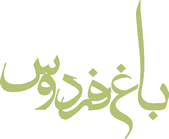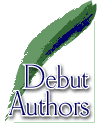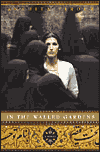



Click and see
Interviews
Bookreporter.com
September 13, 2002
Anahita Firouz, author of IN THE WALLED GARDENS, has written a powerful debut novel that is garnering attention and praise. In this interview with Bookreporter.com's Sarah Rachel Egelman, Ms. Firouz elaborates on the politics and passions that formed the turbulent backdrop for her novel.
BRC: In this novel the narration is shared between the characters of Mahatsee and Reza. Why did you choose to write in this way?
AF: Reza is a Marxist revolutionary and Mahastee is an aristocrat. Their stories are two very personal histories told through two different points of view --- a vantage point unlike what you would experience in that society or in life in general. Both characters, by baring their inner conflicts, also reveal the conflicts of an entire society trying to find its sense of identity and balance. This was particularly important to me.
There's tension here, an apocalyptic urgency as their revelations gather momentum. Reza and Mahastee's interwoven narratives, and by extension the people in their lives, show intersecting worlds at odds both politically and socially. The novel captures a month when these worlds converge only to be driven even further apart. Their narratives reveal turbulence, hairline cracks darting all over and gaining speed, until they split wide open with the seismic quakes of revolution just a few years down the road.
BRC: The Revolution looms large in this book. What idea came first --- the love story or the politics?
AF: The two main characters came first and brought everything with them. Everything was already there in them --- demanding to be told. Reza emerged first, with his politics and torn loyalties and complex layers of allegiance. Not your average revolutionary --- so single-minded as to be one-dimensional. He presented himself arriving one evening in autumn for a concert in the gardens of Bagh Ferdaus. That's where he sees Mahastee after twenty years, a woman who is very much a part of his past. Everything --- plot, passion, details, events --- comes from and spins around these two characters and their inner and outer lives. Love and politics are completely fused here. Both love and politics are mysterious in the final analysis --- how we engage and disengage from them both is fundamentally personal and visceral and emotional. By the end of the novel all the characters are trapped by what they have committed to or else omitted from their lives.
The political story here however, is about the underground groups of the Left in the mid-seventies --- who epitomized rebellion for a while --- until everything was redirected and swept away by the tidal wave of Islamic fundamentalism. I've never subscribed to a particular ideology but I'm fascinated by how politics and ideology make and unmake an individual's life, and how they propel, distort and create turbulence in a society. Turbulence is all about emotion.
BRC: Do you feel this story is particular to Iran or do these characters transcend their specific time and place?
AF: The story is all about two Iranian characters, and also about Tehran, the city. It's about an era and its particular mindsets. It's a very Iranian novel, very much so in every sense. But Bill Robinson in his review for Mostlyfiction.com, is completely right in saying that this is a novel also about any developing country and late 20th century Westernization. It's about those tottering infrastructures, political instabilities, alienation and violence; but then also about the web of traditions and close-knit families and grace of living and indefinable moments there. Ultimately, the characters in the novel, shaped as they are by a society they're trying to reshape, struggling and caught in the vortex of history, transcend time and place.
BRC: Is the world inhabited by these characters gone or fundamentally changed by the Revolution?
AF: It's gone, that world is gone. All things have changed and everyone with them. Even personal rituals, family Friday luncheons, summer weddings, the old gardens. Perhaps vestigial things remain. But the very structure and existence of that society --- and its people who are the engines driving it --- have changed forever, also in how those individuals define and see themselves. And of course Tehran has changed and grown into a giant metropolis. And the world has shifted so that unlike that era when so many students and intellectuals were Marxist revolutionaries and revolutions everywhere were imagined and made by the Left, there are now other ideologies vying for power, slicing and dicing the political landscape.
BRC: What are your feelings about the current situation in the Middle East?
AF: I have a positive outlook, though the problems of the Middle East --- democracy, religious turmoil, oil, Palestine --- are complicated and often seem insurmountable. We experience the tribulations inflicted by history in human time, whereas the time history itself requires to bend and shape and solve problems is on an altogether different scale. We despair because our life passes quickly it seems, whereas history seems to crawl along often, and its eruptions only leave a legacy of tangled problems and a human wasteland in their wake. Middle Eastern societies need to evolve organically. To implement their reforms they need to find their own solutions from the inside out, rather than getting them rushed or condensed or imported. That's their great challenge.
BRC: This is your debut work. How did you feel seeing your book in the store for the first time? What has been the early reader feedback?
AF: It was great to see my novel in the store for the first time. So satisfying! And the cover is so elegant and mysterious, it's visually arresting and distinct. I must say my early reader feedback has been terrific. I've had all ages and types and different nationalities. They say the story is gripping, that it transports them into another world; they love my style, which is particular, so I'm getting a lot of comments about that. They're moved, drawn in by this turbulent fusion of love and politics, this vanished era brought back to life. They're all in Tehran --- no matter where they're from --- living the story. A New Yorker wrote me, "My mind is in Tehran but I have to start work tomorrow! Help!"
BRC: Who are some authors who influenced you?
AF: Dostoevsky, Tolstoy, Turgenev, Flaubert, Conrad, James, Graham Greene.
BRC: What are you working on now?
AF:
I've been working on a story about Iran in the 19th century. But I'm still
not sure if that's the one I'll stay with. I may still switch suddenly to
something contemporary.
Authors on the Web June 2002
The guests are first-time published authors, some participants have recently made their debut on the American publishing scene after being published overseas. Others have written short stories or poetry and are now debut novelists.
The participants are Steve Almond, David Benioff, Jill Bialosky, Terrence Cheng, Jill A. Davis, Stella Pope Duarte, Anahita Firouz, Ad Hudler, Masha Hamilton, Kate Manning, Jay Nussbaum, Arthur Phillips, Michael Redhill, David Rosenfelt, Gary Shteyngart, Karen V. Siplin, and Ali Smith. (Following Q&A was done in June 2002)
Questions
1. AOTW:
Did you outline before you began your book, or did
you let the story evolve on its own? Whether you outlined, or not, did the
story end up the way you planned?
-AF: I did not outline my novel either before or while writing it. I only knew how the book would begin and how it would end. The story evolved on its own and the characters took over, and the plot revealed itself only as I wrote the novel. But writing is all about contradictions. So while I wasn't consciously aware of how each chapter would proceed or how the characters would tell the story, I was spending a great deal of time --- in what seemed a random sort of way --- mulling over the book. And so it did emerge perfectly structured and organized. Also, I did know how it would all end, because I wrote the epilogue right after writing the first chapter.
2. AOTW: Describe your editing process. Do
you write and then go back to edit later, or do you revise a page until it
is right, then proceed to the next page, and so on?
-AF: I revise as I go along, usually every few pages at a time. When I begin my work every morning, I revise whatever I've written the day before. Only then do I start writing new pages. I can't proceed without doing this. I find editing to be a terrific discipline --- crucial, inspiring and liberating. Every writer needs to be a ruthless editor.
3. AOTW:The dread of all writers, from novelists
to columnists to college students at exam time is writer's block. What methods,
or tricks, if you will, have you utilized to overcome the blank stare at the
blank page?
-AF: I believe and agree with what I've also
heard a Dutch writer say once on NPR: it's better to relax and let the novel/writing
come to you instead of forcing it. A sort of philosophy and faith that things
will reveal themselves to you naturally, and you must be aware and "tuned
in," because you're working on it at a subconscious level anyway. However,
I also believe in discipline and in writing every day, even if the writing
doesn't flow immediately or flow at all. To overcome writer's block I go back
and read everything I've written before the page or section I'm stuck on.
Often revisions reveal dead-ends and also "artificial" writing ---
things that don't belong, aren't natural and integral to the novel and are
therefore contrived and misleading. Also, I'll often put on a CD and turn
it up very loud. The music blocks out the outside world and helps me to focus
and enter the world of my novel. I need to be inside that world to write.
4. AOTW: Do you have a "day job,"
in addition to being a published author? How do you balance your "day
job" with writing books?
-AF: I do not have a "day job." But I do have children and through the years I've enjoyed being a very involved mother of two and a writer with a relatively flexible schedule because I've worked at home. Working at home has its own kind of difficulties but also many rewards.
5. AOTW: In Stephen King's On Writing, he
prescribed two things, which every aspiring writer must do: 1) read a lot
and 2) write a lot. Do you agree with him? And if so, how do you balance reading
and writing?
-AF: Of course, every writer should read a lot. But I used to read a lot even as a teenager. Our house is full of books. I always have piles of books waiting to be read. I read in two languages and from a wide range of subjects. I have a fiction pile --- old and new works. I have another pile of nonfiction books to read for my research. For example, for my novel, In the Walled Gardens, I did extensive research that required a huge amount of reading. And then also I have random books I pick up for inspiration or because of my interests --- history, cultural studies, travel, politics and religion, poetry. I write during the day, so I try to read earlier in the morning or at night mostly, and I often take notes.
6. AOTW: Where do you write? What do you envision
as your "perfect" writing room?
-AF: I
write in a large study with large windows and plenty of light on our second
floor. I can see green trees and the roofs of my neighbors. I have a big computer
table, bookshelves on one wall, a CD player, and a huge cork board on another
wall covered with photos and clippings and our children's artwork and scraps
of this and that from all sorts of places over the years. I think it's a good
room for writing.
7. AOTW: Who is your "first reader" or "readers" when you finish your work?
-AF: I think of my husband as a reader, my children, and also "abstract" readers out there --- those who share my sensibilities and demand good writing and a good story that will matter and make them care. Of course I think of my agent and now my editor as first readers too.
8. AOTW: Was there promotion/marketing done for your first book? If so, what was it? What might you have done differently? Did you or your publisher use the web to promote your book? Do you have a website? How are you using your website?
-AF: Though my novel is not out yet, I can answer
part of this question by saying that yes, my publisher is using the web to
promote my novel. I've also been and continue to be involved, researching
and passing along as many relevant websites as possible to my publisher. Although
I don't have a website yet, I do plan on having one by August for my novel.
Copyright 2002, AuthorsOnTheWeb.com. All rights reserved. Debut Authors logo and above text is used with permission
©2002 Anahita Firouz
